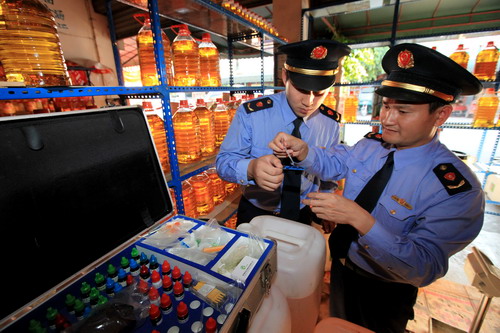Food safety complaints more common
Updated: 2011-11-01 10:18
By Zhou Wenting (China Daily)
|
|||||||||||
|
Inspectors with the commercial authority in Rongan county, South China's Guangxi Zhuang autonomous region, test samples of cooking oil on Oct 17. [Photo/ China Daily] |
BEIJING -The latest quarterly report from the China Consumers' Association shows that the public is becoming more concerned about food quality.
And at a time when watchdogs are becoming more vigilant in cities, experts are warning that residents of rural areas are at the worst risk of being victims of faulty food products.
In the third quarter, the association received more than 10,000 complaints about the food industry, 22 percent more than it had in the same period a year ago. A chief contributor to that increase was sales of expired food.
On Sept 19, a grocery store owner in Linhai city of East China's Zhejiang province, who would only state his surname, Wu, reported to the local industrial and commercial bureau that a salesman had sold expired and substandard food to his store.
"It was the second time I had encountered that type of situation in a month," Wu said. "The salespeople claimed they purchased the products from wholesalers."
Experts said they have also noticed that expired and counterfeit food products are beginning to be traded more frequently in remote areas, especially in the countryside.
"Some food businesses will transfer their products from urban to rural areas when (the products) are getting close to their expiration dates," said Qiu Baochang, head of the lawyers group of the China Consumers' Association.
Dong Jinshi, executive vice-president of the International Food Packaging Association, also said a certain quantity of food that is supposed to be recalled or destroyed has not yet been removed from store shelves, even though it is expired or is of a poor quality. Much of it has made its way into the countryside, he said.
"No government agencies have the responsibility of monitoring recalls," Dong said. "So it remains unknown if the faulty food has been recalled and how businesses have dealt with the recalled products."
Experts said rural consumers have less ability to buy things and to assess the quality of food.
"But the growing number of complaints reveals a better awareness that they can protect their rights," Qiu said.
Experts said the supervision of food safety should be strengthened in the countryside and guidance should be given to store owners in remote places.
"They should be asked to carefully check business licenses when they receive goods from suppliers and to avoid making purchases from suspect sources," Qiu said.
The report also showed that another large complaint has to do with the abuse of food additives.
"Some consumers have found an inappropriate use of food additives, such as preservatives, pigments and essences, in food products," the report said.
"In the food additives listed on a package of some steamed bun products, some consumers have found tartrazine, which is prohibited for use in staple foods. This demonstrates the public's better command of information about food safety."











